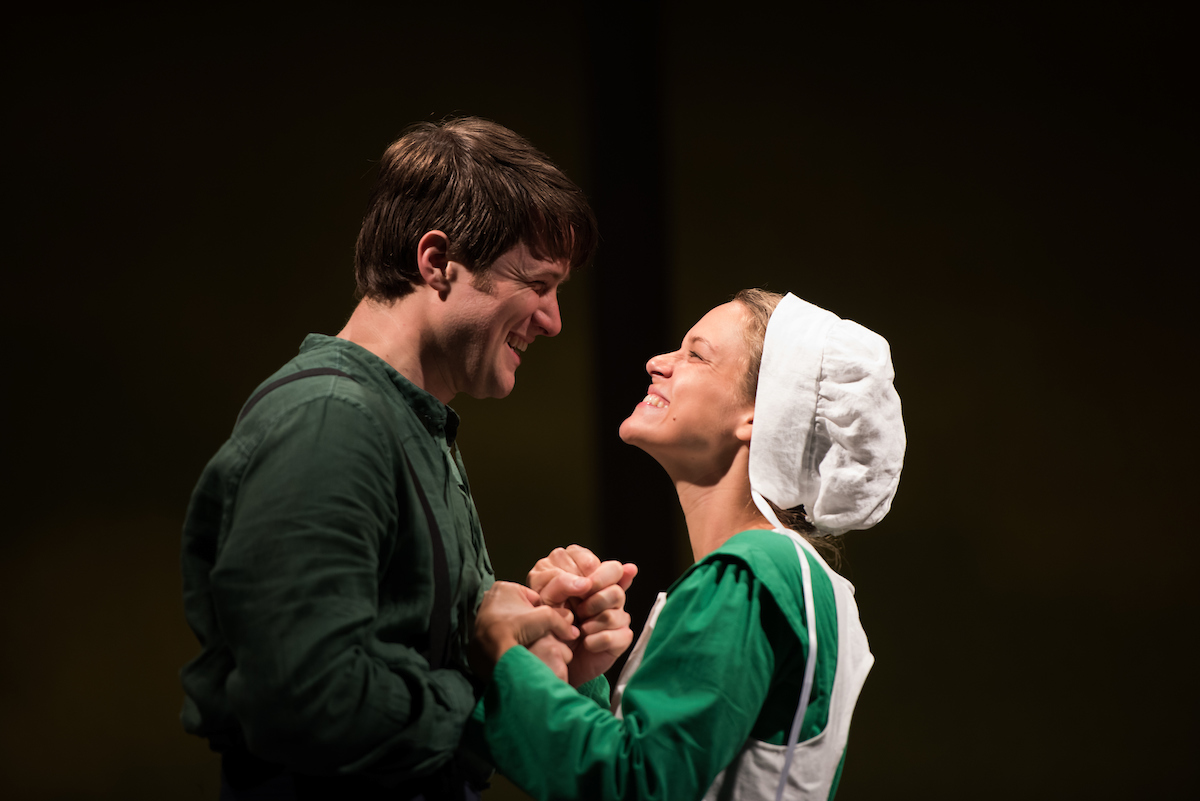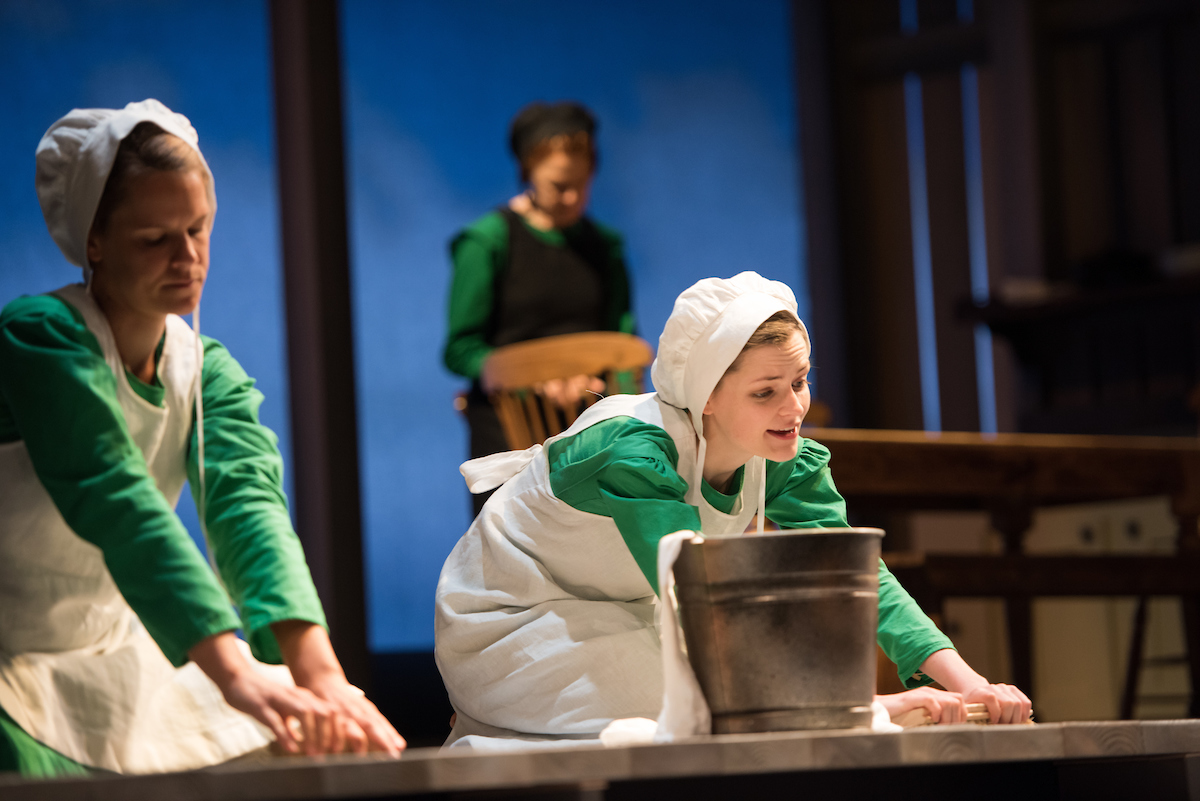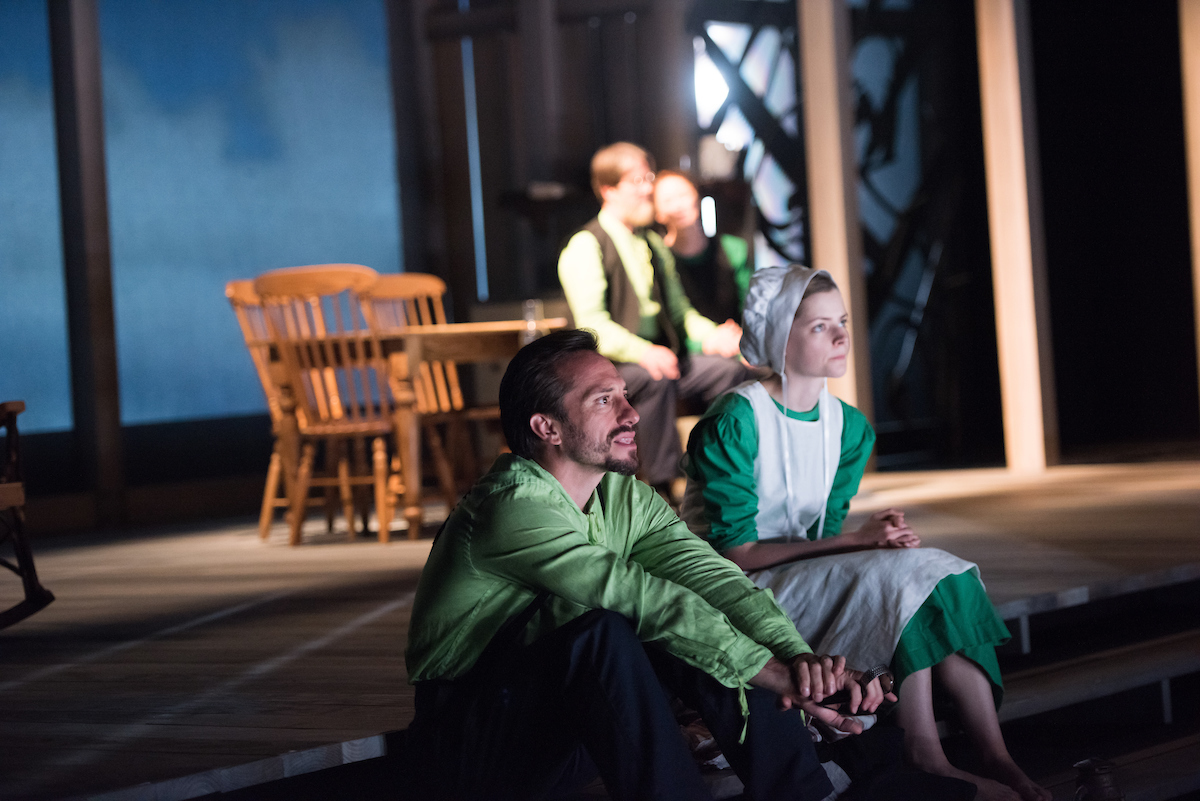by
——–
Everything Is Wonderful
![]()
closes July 30, 2017
Details and tickets
——–
So tell me what’s better: living in the love, support, and strength of a community at the cost of your independence, or living a life that’s free and lonely?
“Living with other people and learning to lose ourselves in the understanding of their weakness and deficiencies can help ourselves to become true contemplatives,” the philosopher Thomas Merton wrote. “For there is no better way of getting rid of the rigidity and harshness and coarseness of our ingrained egoism…”
Jacob (Paul Deboy), Amish farmer and philosopher, has just obtained a marvelous opportunity to become a true contemplative. Eric (Jacob Babinsky), having recently killed Jacob’s two sons through his negligent driving, has appeared on the doorstep begging – well, not forgiveness; Jacob has already forgiven him, but redemption.
To the extent that he can, Jacob gives it to him. He takes Eric into his household; allows him to sleep in the barn; gives him a shovel and a hoe and chores to do; feeds him at his table; and gives him the clothes of his dead sons to wear. But redemption, as Barabbas and Richard Nixon could tell you, is a tricky thing. For Eric has wounded not just Jacob but Jacob’s wife Esther (Hollis McCarthy) and daughters Miri (Jessica Savage) and Ruth (Lexi Lapp), and the whole community, represented by the strapping Abram (Lucky Gretzinger).
That community, united as it is in its relentless submission to the will of God, is able to forgive Eric’s act, and even Eric, for to fail to do so would be, however obliquely, a criticism of God. But to embrace him is a different story – not because of the grossness of Eric’s offense, but because he is “English”; which is to say, an outsider.

Lucky Gretzinger and Jessica Savage in “Everything is Wonderful” by Chelsea Marcantel. (Seth Freeman)
Eric’s dilemma is also the dilemma of Miri, who has become an outsider by choice, after being grossly offended by the ultimate insider, Abram. To her, Jacob’s compassion toward Eric is yet another betrayal; he forgives the man who killed his sons, but he cannot forgive his daughter for rejecting the community which has humiliated her.
This would be an explosive landscape for any playwright, but Chelsea Marcantel navigates it with great care and considerable wit. She plays with time a bit, yo-yoing back and forth whenever she needs the past to illuminate the present. Savage is spot-on as a fourteen-year-old, radiating the disinhibited energy which made her attractive to Abram and beloved by the rest of her family; the absence of this energy, in her dour present tense, helps us to see her empty heart, and what she lost in her encounter with Abram. There is less distinction between Gretzinger’s younger and older selves; at any age, he reeks of self-importance, which may have been Marcantel’s point.
Ultimately, the bonds of community, which help to sustain Jacob and Esther and their family in the face of their terrible loss, also – incompletely – helps Eric walk away from the empty life that he has led to that point toward something richer, more fulfilling, and more purposeful. At the same time, those bonds have brought Miri, a vigorous, loving and highly intelligent person, into a well of loneliness and despair.
There are themes here which, in less competent hands, could result in a cheap, clichéd story, but Marcantel, director Ed Herendeen, and this fine cast know a hawk from a handsaw. The characters will not resolve their terrible dilemmas within the two hours’ traffic of our stage, or maybe ever, but it is sufficient that they know what they are about, and try to do what they must.
A few technical notes: the actors periodically speak in an Amish dialect, which contains elements of German pronunciation, but with a lilt which sounds almost Irish. The cast applies this dialect – which takes some getting used to – inconsistently, and I conclude (from one of the lines in the play) that when they employ it, it is to indicate that the characters are speaking German to each other.
It is a commonplace that when a reviewer credits the set design, he is damning the rest of the production with faint praise. But this production is terrific, and David M. Barber’s set is out of this world. The main stage is the family’s kitchen, which, when appropriate, opens up into the wide world and the sky. On each side of the kitchen there are dirt paths which lead to the rest of the farm; in front, there is a pile of rich soil, which the characters dig and till. Barber has thus invoked the world of the play within the confines of the Frank stage, magnificently.
I opened this review with a quote from Thomas Merton, whose thought this passionate and compassionate play invokes, extolling community. Let’s close with another one, recognizing the virtue of the person alone:
“Yet it is in this loneliness that the deepest activities begin. It is here you discover act without motion, labor that is profound repose, vision in obscurity, and, beyond all desire, a fulfillment whose limits extend to infinity.”
————–
Everything is Wonderful by Chelsea Marcantel, directed by Ed Herendeen, assisted by Shaun M. McCracken, who also served as dramaturg. Featuring Paul Deboy, Hollis McCarthy, Jason Babinsky, Lucky Gretzinger, Lexi Lapp and Jessica Savage. Set design: David M. Barber . Costume design: Therese Bruck . Sound design and composition: Miles Polaski . Technical director: Zack Hiatt . Stage manager: Tina Shakleford, assisted by Emily Pathman . Production Stage Manager: Debra A. Acquavella . Produced by the Contemporary American Theater Festival . Reviewed by Tim Treanor.








